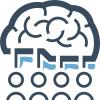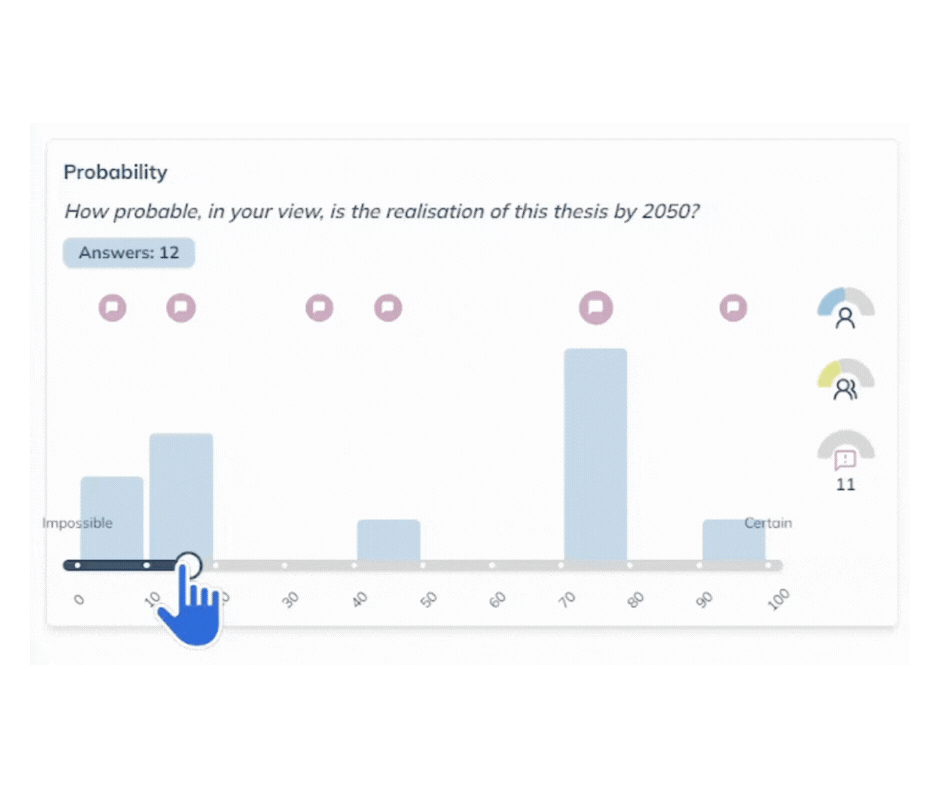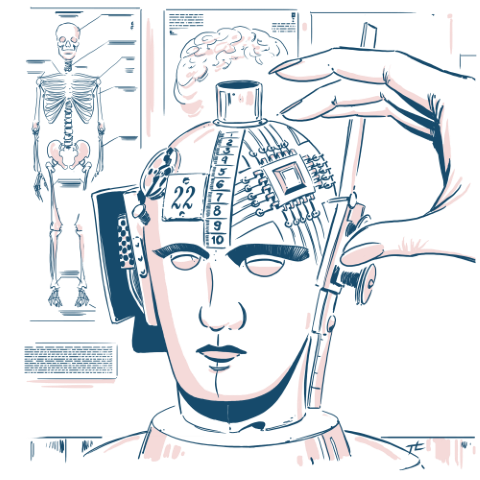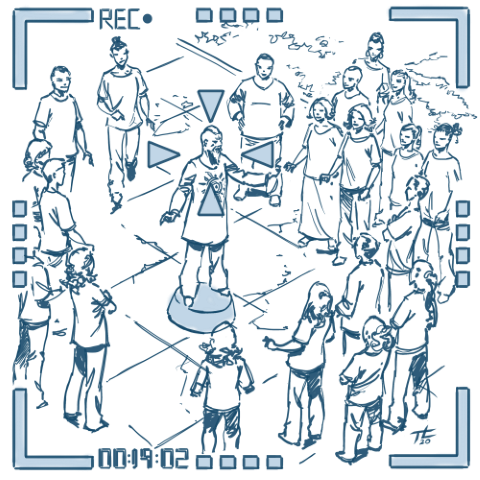Modern Delphi for smarter governance
Structuring dialogue for policy, strategy, and risk


Structuring dialogue for effective modern governance
Modern governance operates in an environment of unprecedented complexity, demanding robust processes for not only developing sound policy but also for crafting resilient strategies (short, medium, and long-term), engaging diverse stakeholders effectively, and proactively managing risks. Navigating interconnected challenges, rapid technological change (including AI), deep uncertainty, and competing public values requires moving beyond traditional consultations or internal planning sessions towards more structured, inclusive, and insightful methods.
The Delphi method, especially in its advanced Real-Time Delphi (RTD) form, provides a powerful framework for facilitating the necessary deep dialogue and collective reasoning. As AI offers new analytical tools but also introduces new complexities, the need for rigorous human deliberation methods like Delphi to interpret information, align on values, and build legitimate consensus becomes more critical than ever for responsible governance.

Why Delphi matters for policy, strategy, and governance
Delphi’s unique characteristics directly address persistent challenges in public sector decision-making:
![]() Managing diverse stakeholder and expert input: Policy and strategy impact many groups. Delphi’s anonymity allows input from technical experts, civil servants, community leaders, industry figures, NGOs, and citizens to be considered on merit, reducing the influence of hierarchy or political pressure.
Managing diverse stakeholder and expert input: Policy and strategy impact many groups. Delphi’s anonymity allows input from technical experts, civil servants, community leaders, industry figures, NGOs, and citizens to be considered on merit, reducing the influence of hierarchy or political pressure.
![]() Navigating complexity, uncertainty and risk: Many governance issues involve intricate systems and uncertain futures. Delphi’s iterative structure enables panels to collectively explore these complexities, identify potential risks (including low-probability/high-impact ones), examine different facets of an issue, and grapple with ambiguity constructively.
Navigating complexity, uncertainty and risk: Many governance issues involve intricate systems and uncertain futures. Delphi’s iterative structure enables panels to collectively explore these complexities, identify potential risks (including low-probability/high-impact ones), examine different facets of an issue, and grapple with ambiguity constructively.
![]() Surfacing assumptions for robust planning: The emphasis on reasoning forces participants to articulate the assumptions underpinning their views on policy effectiveness, strategic priorities, or risk likelihoods. Making these assumptions explicit is vital for stress-testing plans and building more resilient strategies.
Surfacing assumptions for robust planning: The emphasis on reasoning forces participants to articulate the assumptions underpinning their views on policy effectiveness, strategic priorities, or risk likelihoods. Making these assumptions explicit is vital for stress-testing plans and building more resilient strategies.
![]() Synthesizing expertise and values: Effective governance requires integrating technical/analytical insights with societal values and ethical considerations. Delphi provides a framework to systematically gather expert assessments alongside stakeholder judgments on desirability, equity, or acceptability.
Synthesizing expertise and values: Effective governance requires integrating technical/analytical insights with societal values and ethical considerations. Delphi provides a framework to systematically gather expert assessments alongside stakeholder judgments on desirability, equity, or acceptability.
![]() Building shared understanding and legitimacy: The focus on sharing justifications promotes mutual learning and clarifies why different positions exist, fostering understanding even without full agreement. This transparency enhances the perceived legitimacy of the process and its outcomes.
Building shared understanding and legitimacy: The focus on sharing justifications promotes mutual learning and clarifies why different positions exist, fostering understanding even without full agreement. This transparency enhances the perceived legitimacy of the process and its outcomes.

Key Delphi applications in the governance cycle
Delphi’s flexibility supports various critical tasks:
![]() Policy development and evaluation: Identifying policy challenges, exploring potential solutions, assessing their likely effectiveness, feasibility, impacts (positive and negative), and building consensus on recommendations.
Policy development and evaluation: Identifying policy challenges, exploring potential solutions, assessing their likely effectiveness, feasibility, impacts (positive and negative), and building consensus on recommendations.
![]() Strategic planning and foresight: Exploring future operating environments, identifying long-term strategic priorities for agencies or governments, assessing different strategic pathways, and building alignment on goals across departments or stakeholder groups.
Strategic planning and foresight: Exploring future operating environments, identifying long-term strategic priorities for agencies or governments, assessing different strategic pathways, and building alignment on goals across departments or stakeholder groups.
![]() Risk identification and management: Systematically identifying and assessing potential risks associated with policies, programs, or external trends (geopolitical, technological, environmental); evaluating potential mitigation strategies.
Risk identification and management: Systematically identifying and assessing potential risks associated with policies, programs, or external trends (geopolitical, technological, environmental); evaluating potential mitigation strategies.
![]() Guideline development and standard setting: Building expert and stakeholder consensus on guidelines, regulatory standards, professional codes, or public service protocols.
Guideline development and standard setting: Building expert and stakeholder consensus on guidelines, regulatory standards, professional codes, or public service protocols.
![]() Stakeholder engagement and participatory processes: Using Delphi for structured consultation with specific stakeholder groups or even broader citizen panels on policy issues, resource allocation, or community planning.
Stakeholder engagement and participatory processes: Using Delphi for structured consultation with specific stakeholder groups or even broader citizen panels on policy issues, resource allocation, or community planning.

The advantage of modern RTD for agile and inclusive governance
Real-Time Delphi (RTD) offers distinct advantages for the dynamic nature of modern governance:
![]() Timeliness and efficiency: RTD allows for much faster consultation cycles, crucial for responding to emerging issues or meeting policy development timelines within practical resource constraints.
Timeliness and efficiency: RTD allows for much faster consultation cycles, crucial for responding to emerging issues or meeting policy development timelines within practical resource constraints.
![]() Broader and scalable engagement: Online RTD platforms remove geographical barriers, making it feasible to engage larger numbers of experts or stakeholders (from small focused panels to potentially hundreds of participants) far more easily than traditional methods. This supports more participatory and inclusive approaches where appropriate.
Broader and scalable engagement: Online RTD platforms remove geographical barriers, making it feasible to engage larger numbers of experts or stakeholders (from small focused panels to potentially hundreds of participants) far more easily than traditional methods. This supports more participatory and inclusive approaches where appropriate.
![]() Dynamic input and iteration: Enables quicker incorporation of new information and allows participants to refine views dynamically as the collective understanding evolves.
Dynamic input and iteration: Enables quicker incorporation of new information and allows participants to refine views dynamically as the collective understanding evolves.

Next-generation platforms: Enabling deep deliberation for complex governance
To tackle today’s complex governance challenges effectively requires moving beyond basic RTD tools. Next-generation RTD platforms are designed to facilitate the necessary depth of dialogue and understanding:
![]() Prioritizing intuitive user experience (UX) for inclusivity: Effective governance often requires engaging diverse stakeholders, including citizens or non-technical experts who may be unfamiliar with Delphi. A clunky, intimidating, or overly complex platform interface acts as a significant barrier, discouraging participation from these vital groups and potentially skewing results towards the more tech-savvy. Next-generation platforms like 4CF Halnyx 2.0 prioritize clean, modern, intuitive design, making the process accessible and less daunting for all participants, thereby supporting the broader, more representative engagement crucial for legitimate policy dialogue.
Prioritizing intuitive user experience (UX) for inclusivity: Effective governance often requires engaging diverse stakeholders, including citizens or non-technical experts who may be unfamiliar with Delphi. A clunky, intimidating, or overly complex platform interface acts as a significant barrier, discouraging participation from these vital groups and potentially skewing results towards the more tech-savvy. Next-generation platforms like 4CF Halnyx 2.0 prioritize clean, modern, intuitive design, making the process accessible and less daunting for all participants, thereby supporting the broader, more representative engagement crucial for legitimate policy dialogue.
![]() Focusing on the ‘Why’ in policy and strategy: Advanced platforms like 4CF Halnyx 2.0 make it effortless to explore the reasoning behind different policy preferences, strategic assessments, or risk ratings, enabling a deeper understanding of trade-offs and assumptions.
Focusing on the ‘Why’ in policy and strategy: Advanced platforms like 4CF Halnyx 2.0 make it effortless to explore the reasoning behind different policy preferences, strategic assessments, or risk ratings, enabling a deeper understanding of trade-offs and assumptions.
![]() Managing diverse inputs effectively: Sophisticated visualization and analysis tools help synthesize input from potentially large and diverse panels, ensuring critical perspectives (outliers, specific stakeholder concerns) are not lost and can be integrated into the analysis.
Managing diverse inputs effectively: Sophisticated visualization and analysis tools help synthesize input from potentially large and diverse panels, ensuring critical perspectives (outliers, specific stakeholder concerns) are not lost and can be integrated into the analysis.
![]() Supporting nuanced dialogue on values and trade-offs: Features enabling interaction and structured debate around specific arguments allow for more sophisticated deliberation on the complex ethical considerations and value judgments inherent in public policy and strategy.
Supporting nuanced dialogue on values and trade-offs: Features enabling interaction and structured debate around specific arguments allow for more sophisticated deliberation on the complex ethical considerations and value judgments inherent in public policy and strategy.
![]() Integrating human judgment with AI analysis: As AI tools are used more in policy modeling or risk analysis, next-gen Delphi platforms provide the vital human interface for experts and stakeholders to collectively scrutinize AI outputs, debate implications, ensure alignment with public values, and build trust in informed decisions.
Integrating human judgment with AI analysis: As AI tools are used more in policy modeling or risk analysis, next-gen Delphi platforms provide the vital human interface for experts and stakeholders to collectively scrutinize AI outputs, debate implications, ensure alignment with public values, and build trust in informed decisions.
Platforms like 4CF Halnyx 2.0 built for intuitive interaction and deep reasoning exploration, provide the robust environment needed for conducting high-quality, insightful deliberation on critical governance issues.

Building smarter, more resilient governance with modern Delphi
Effective public policy and strategic planning in the 21st century demand rigorous processes that transparently integrate diverse expertise, stakeholder values, and a clear understanding of complexities and risks. The Delphi method, particularly in its modern Real-Time Delphi form, provides an invaluable framework for this task.
By moving beyond superficial consultations and leveraging next-generation platforms like Halnyx 2.0 designed for deep interaction, reasoning exploration, and scalable participation, public institutions can foster richer understanding, build more robust consensus, and ultimately develop smarter, more legitimate, and resilient policies and strategies to serve the public good in an increasingly complex world.

Experience the next generation of Delphi
4CF Halnyx 2.0 provides the intuitive, powerful, and insight-focused platform needed to conduct effective Real-Time Delphi studies that deliver meaningful results.
Interested in Delphi and RTD? Explore our expert series:
4CF Delphi Expert Series offers comprehensive insights, drawing on extensive experience, covering everything from the fundamentals to advanced applications and the crucial role of next-generation platforms. Whether you're new to Delphi or an experienced practitioner, explore these articles to deepen your knowledge and enhance your results.






Explored these? Discover even more in our full Delphi series
Interested in Delphi and RTD? Explore our expert series:
4CF Delphi Expert Series offers comprehensive insights, drawing on extensive experience, covering everything from the fundamentals to advanced applications and the crucial role of next-generation platforms. Whether you're new to Delphi or an experienced practitioner, explore these articles to deepen your knowledge and enhance your results.
Explored these? Discover even more in our full Delphi series
Stay updated! Subscribe to our newsletter:
By subscribing to our newsletter, you consent to the processing of the provided data. The data controller is 4CF Sp. z o.o., its registered office is located in Warsaw, 10/14 Trzech Krzyży Square, postal code: 00-499.
We process your data solely for the purpose of sending information about 4CF Sp. z o.o. and its activities via e-mail. Your data will be processed until your consent is revoked through a link that will be included in each newsletter. The withdrawal of consent shall not affect the lawfulness of processing based on consent before its withdrawal. Providing your data is voluntary, but necessary if you wish to receive information about 4CF Sp. z o.o. and its activities. We may transfer the data to our suppliers of services related to the processing of personal data, e.g. IT service providers. Such entities process data on the basis of a contract with our company and only in accordance with our instructions. You have the right to request access to your personal data, its rectification, deletion or limitation of processing, as well as the right to lodge a complaint with the supervisory authority. More information about your rights and about the processing of your personal data can be found in our privacy policy.






